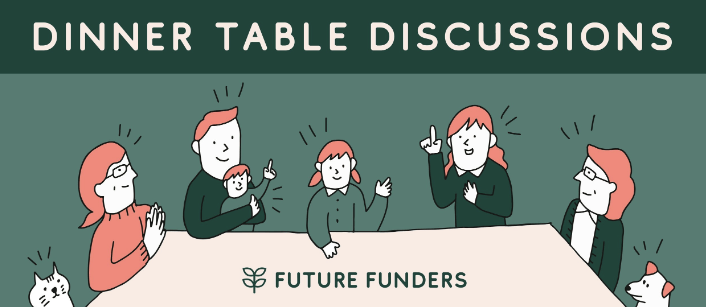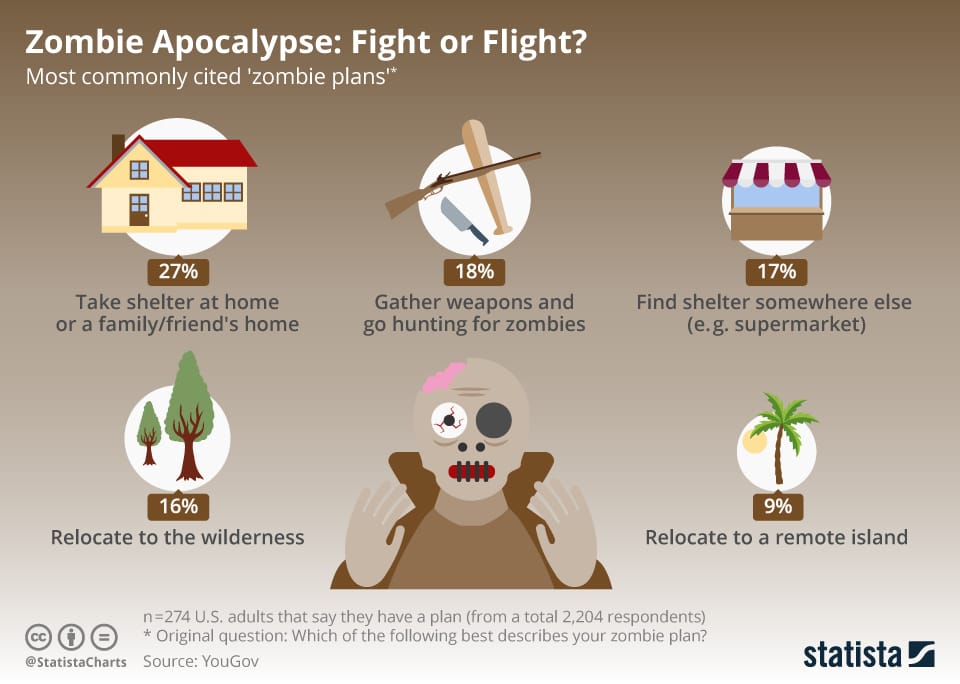📢 A Message from our Sponsor
10 Amazon Prime Benefits You Need To Be Using
Amazon Prime offers more than just speedy delivery; it includes unlimited photo storage, free release-date delivery, and early access to lightning deals, among other hidden benefits. Don't miss these 10 hidden perks that can enhance your membership.

Welcome Back, Future Funder!
We’ve got a fun one for you this week. When the world as we know it collapses, traditional currency loses all meaning, and survival depends on adaptability and resourcefulness. Here’s a deep dive into the economics of a post-apocalyptic society.
Bon a petit! 🧑🍳
🍽️ Main Course: 🧟♀️The Economics of the Undead

Money in a zombie apocalypse? Useless. Survival? Priceless. When society collapses and cash becomes nothing more than kindling, new rules of economics rise from the ashes.
💱 Bartering: The New Economy
In the aftermath of a monetary system collapse, bartering becomes the primary means of exchange. Survivors trade goods and services directly, prioritizing immediate utility over abstract worth.
Key Features of the Barter Economy:
Essential Commodities: Items like food, water, medical supplies, and ammunition are highly sought after.
Valuable Skills: Expertise in areas like medicine or mechanical repair holds tremendous worth in trade.
Key Bartering Items
Food and Water:
Non-perishable goods and water purification tools are indispensable for survival.Medical Supplies:
Items such as first aid kits, antibiotics, and other health-related essentials are critical in emergencies.Ammunition:
In a dangerous world, ammo serves as both a defensive necessity and a high-value trade commodity.Skills:
Practical abilities—like farming, medicine, or repair work—can be exchanged for goods and services.
In a barter-based economy, survival hinges on trading what you have or what you can do for what you need.
By focusing on utility-driven exchange, survivors can thrive in a world without traditional currency.
🪙 Resource Hoarding: Gold and Beyond
In the wake of societal collapse, gold and silver may temporarily lose their value as survival needs take precedence. However, as stability begins to return, these metals might regain significance as a basis for new currencies or as stores of value.
In the meantime, the focus shifts to hoarding essential resources that ensure survival or provide trade opportunities.
Key Considerations for Resource Hoarding
Essential Goods:
Prioritize stockpiling items that address immediate survival needs, such as food, water, and medical supplies.Trade Potential:
Focus on universally useful goods that can be exchanged in a barter economy. Examples include tools, batteries, or fuel.Security Risks:
Hoarding valuable items may attract unwanted attention. It’s crucial to ensure proper concealment and establish strong defense measures.
In unstable times, survival hinges on what you have—not just in terms of resources, but in preparation and security.
Balancing immediate needs with future trade opportunities can help you thrive as society begins to rebuild.
🏗️ Rebuilding Markets Post-Collapse
As communities begin to stabilize, societies naturally progress toward re-establishing structured economies. This often starts with localized barter systems that gradually evolve into organized markets with agreed-upon mediums of exchange. Over time, currencies backed by tangible assets—such as precious metals or essential goods—may emerge as trust and societal structures rebuild.
Steps to Rebuild Markets
Establish Trust:
Build community agreements that promote fair and honest trade among participants.Create Trade Hubs:
Designate safe, central locations where goods and services can be exchanged without fear of conflict.Develop Currency:
Introduce a new form of currency as stability improves, ideally backed by valuable, tangible resources to foster trust and adoption.Implement Regulations:
Create and enforce rules to prevent exploitation, protect trade fairness, and encourage equitable practices.
Rebuilding markets requires more than resources—it demands trust, organization, and a collective commitment to fairness.
As these steps are implemented, communities can lay the groundwork for economic recovery and long-term prosperity.
🧠 Psychological Resilience
Surviving in a post-apocalyptic world demands more than physical resources—mental fortitude is essential. Developing specific psychological traits can greatly enhance survival prospects in such challenging environments.
Key Components of Psychological Resilience
Adaptability:
Embrace change and find ways to thrive in unpredictable circumstances by maintaining a flexible mindset.Problem-Solving Skills:
Innovate and overcome challenges with limited resources. Creative thinking can be the difference between survival and failure.Collaboration:
Work with others to build a supportive community. Cooperation fosters emotional strength, resource sharing, and collective problem-solving.Proactive Mindset:
Focus on solutions and maintain a forward-looking attitude to stay motivated even in dire situations.
Surviving isn’t just about enduring hardship; it’s about adapting, connecting, and finding strength in the face of adversity.
By cultivating these skills, individuals can significantly enhance their ability to navigate the psychological challenges of survival.

Most commonly cited strategies in a zombie apocalypse (Image credit: Statista)
🌟 What it all comes down to
Adaptability:
Flexibility in adopting new economic practices is crucial for survival in crisis scenarios.Resource Management:
Prioritize essential items for both bartering and personal use to ensure short-term survival and long-term stability.Community Building:
Collaborative efforts are essential for reconstructing functional societies, fostering trust, and pooling resources.
While a zombie apocalypse remains fictional, studying the dynamics of economies in crisis provides valuable insights into human behavior and societal resilience.
Understanding how people adapt to extreme circumstances can teach us about the importance of preparation, flexibility, and collaboration in any crisis.
Cheers to getting 1% better each week! 🥂
📢 A Message from 1440 Media
Seeking impartial news? Meet 1440.
Every day, 3.5 million readers turn to 1440 for their factual news. We sift through 100+ sources to bring you a complete summary of politics, global events, business, and culture, all in a brief 5-minute email. Enjoy an impartial news experience.
🧙♀️ Your wish is our command
What did you think of today's email?
Thanks for reading.
Until next time!
Your friends @ Future Funders 🍽️
p.s. If you liked this newsletter, share it with your friends and colleagues here.
